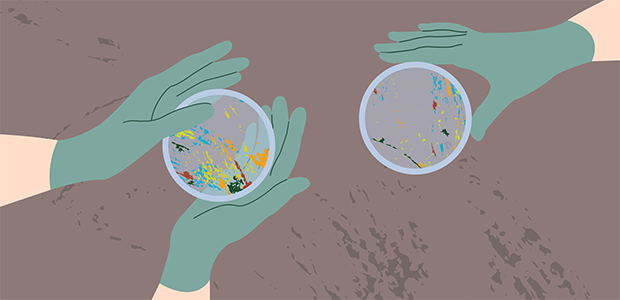
Cellugy secures €8.1M to eradicate microplastics in personal care products
Cellugy, a Danish industrial biotechnology startup developing innovative, biobased solutions to replace fossil-based materials in the personal care sector, has secured €8.1 million to support scaling up the production of its biofabricated cellulose-based rheology modifier material, EcoFLEXY.
The new funding comes in the form of a grant from the LIFE Programme, the European Union’s funding instrument for projects supporting environment and climate action.
EcoFLEXY is designed to replace fossil-based carbomers, known as harmful microplastics, significantly reducing environmental pollution and the use of hazardous chemicals in the cosmetics sector. It delivers superior product performance and adaptable sensorial properties, along with scalable, operationally efficient manufacturing to meet the needs of a fast-evolving beauty industry focused on sustainability and innovation.
The release of microplastics from personal care products is a growing concern, as studies indicate that products such as facial scrubs and liquid soaps contribute to environmental pollution. Recent research also suggests that microplastics can enter the human body through inhalation, ingestion, or skin contact, raising questions about their potential impacts on human health. Rheology modifiers, for example, are essential to virtually every personal care product, from skincare and colour cosmetics to deodorants and oral care. However, nearly 70% of the €2.8 billion global rheology modifier (RM) market remains dependent on fossil-based carbomers and acrylates, which are classified under the EU’s REACH regulation due to their persistent and toxic nature.
Through the BIOCARE4LIFE project, EcoFLEXY is positioned to prevent the release of 259 tonnes of microplastics annually by project completion, scaling dramatically to 1,289 tonnes per year by 2034, equivalent to removing millions of contaminated beauty products from the market each year.
The timing of the project is crucial, as reports suggest the beauty industry could stand to lose around €12 billion ($13 billion) due to the EU microplastics ban and US restrictions on PFAS, also known as ‘forever chemicals’. But the challenge is more than just a sustainability-related issue.
“An alternative material that simply aims to be more sustainable is not enough; the critical challenge is about delivering bio-based solutions that actually outperform petrochemicals in performance parameters like texture, functionality, and user experience, while also being scalable and operationally efficient,” explains Dr. Isabel Alvarez-Martos, CEO and Co-Founder at Cellugy. “Good intentions won't drive industry change; we need higher-quality alternatives like EcoFLEXY that make it easier, not harder, for brands to choose sustainability. Only when bio-based materials match or exceed the performance and economics of traditional ingredients will we see the transformation needed to protect both human health and our planet."
EcoFLEXY offers superior performance and previously unachievable functionalities compared to existing biobased ingredients, such as xanthan and cellulose gums, while eliminating the handling challenges associated with plant-nanocellulose alternatives. The biofabricated cellulose material delivers enhanced stability, compatibility, and sensoriality, critical factors for cosmetics manufacturers who cannot compromise on product quality while meeting growing sustainability demands. This bridges the gap between the performance of fossil-based modifiers and the environmental benefits of natural materials, enabling the creation of effective and eco-friendly personal care formulations.
The BIOCARE4LIFE project will drive EcoFLEXY's scaleup process through the work of a specialist consortium of experts in biotechnology, sustainability, and data management: The Footprint Firm (TFF), a consultancy company focused on circular economy solutions and environmental impact validation, and Sci2sci, a Berlin-based startup specialising in data management, machine learning, and AI-driven process optimisation.
"The project signals real progress toward more sustainable manufacturing in the personal care sector," said Will Nunn, Manager at The Footprint Firm. "Our role is to validate the environmental impact and ensure the best alignment with circular economy principles. The project’s combination of technical innovation and sustainability validation positions EcoFLEXY very strongly for market adoption and supports the EU’s broader transition to a more resource-efficient economy.”
“Scaling a biotech solution is never simple, but it’s where the real value lies,” Angelina Lesnikova, Sci2sci CEO adds. “Our role is to optimise every layer of production, from fermentation parameters to supply chain predictability, so that EcoFLEXY can compete with petrochemical alternatives not just on environmental benefits, but on cost and performance metrics that matter to manufacturers. Together we have the potential to make sustainable chemistry economically irresistible as well as environmentally essential."
The €8.1 million investment will fund critical scaling activities, process optimisation, and commercial validation over a four-year period.
"This grant provides the resources we need to transform our vision into reality. Within three to five years, we expect to be generating significant revenue while delivering a measurable environmental impact. Our end goal is sweeping petrochemicals from an industry worth billions, and we now have the backing and the partnerships to make it happen,” Alvarez-Martos concludes.
For more startup news, check out the other articles on the website, and subscribe to the magazine for free. Listen to The Cereal Entrepreneur podcast for more interviews with entrepreneurs and big-hitters in the startup ecosystem.

